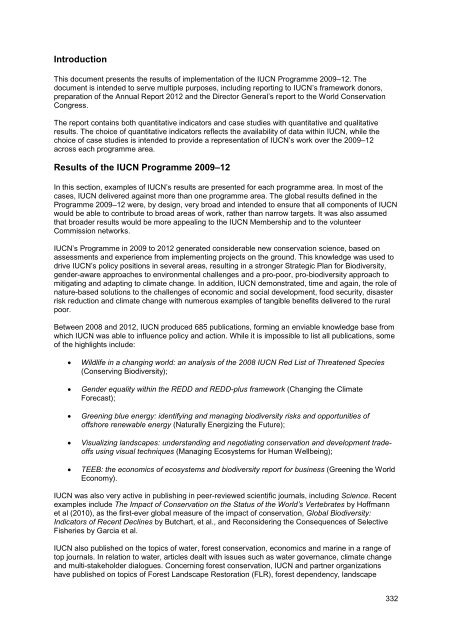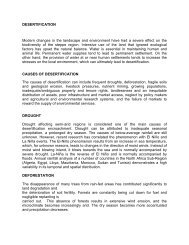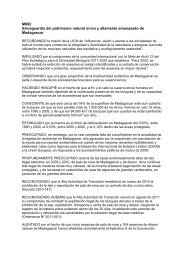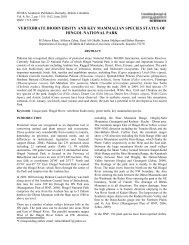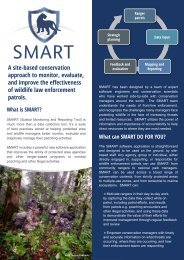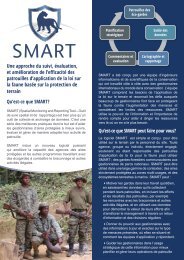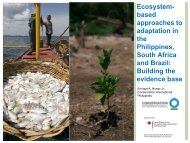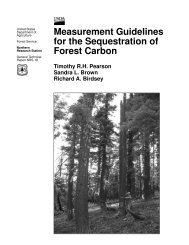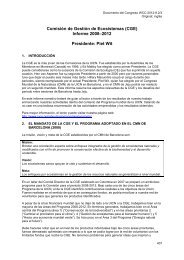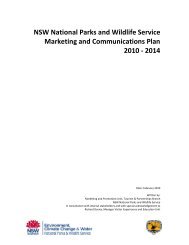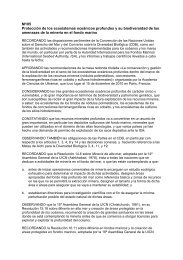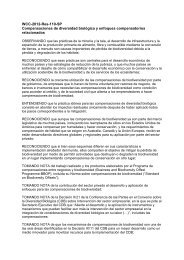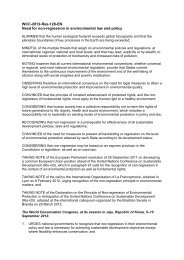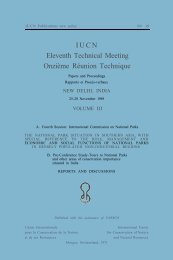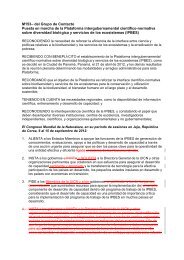IntroductionThis document presents the results of implementation of the <strong>IUCN</strong> Programme 2009–12. Thedocument is inten<strong>de</strong>d to serve multiple purposes, including reporting to <strong>IUCN</strong>’s framework donors,preparation of the Annual Report 2012 and the Director General’s report to the World ConservationCongress.The report contains both quantitative indicators and case studies with quantitative and qualitativeresults. The choice of quantitative indicators reflects the avai<strong>la</strong>bility of data within <strong>IUCN</strong>, while thechoice of case studies is inten<strong>de</strong>d to provi<strong>de</strong> a representation of <strong>IUCN</strong>’s work over the 2009–12across each programme area.Results of the <strong>IUCN</strong> Programme 2009–12In this section, examples of <strong>IUCN</strong>’s results are presented for each programme area. In most of thecases, <strong>IUCN</strong> <strong>de</strong>livered against more than one programme area. The global results <strong>de</strong>fined in theProgramme 2009–12 were, by <strong>de</strong>sign, very broad and inten<strong>de</strong>d to ensure that all components of <strong>IUCN</strong>would be able to contribute to broad areas of work, rather than narrow targets. It was also assumedthat broa<strong>de</strong>r results would be more appealing to the <strong>IUCN</strong> Membership and to the volunteerCommission networks.<strong>IUCN</strong>’s Programme in 2009 to 2012 generated consi<strong>de</strong>rable new conservation science, based onassessments and experience from implementing projects on the ground. This knowledge was used todrive <strong>IUCN</strong>’s policy positions in several areas, resulting in a stronger Strategic P<strong>la</strong>n for Biodiversity,gen<strong>de</strong>r-aware approaches to environmental challenges and a pro-poor, pro-biodiversity approach tomitigating and adapting to climate change. In addition, <strong>IUCN</strong> <strong>de</strong>monstrated, time and again, the role ofnature-based solutions to the challenges of economic and social <strong>de</strong>velopment, food security, disasterrisk reduction and climate change with numerous examples of tangible benefits <strong>de</strong>livered to the ruralpoor.Between 2008 and 2012, <strong>IUCN</strong> produced 685 publications, forming an enviable knowledge base fromwhich <strong>IUCN</strong> was able to influence policy and action. While it is impossible to list all publications, someof the highlights inclu<strong>de</strong>:• Wildlife in a changing world: an analysis of the 2008 <strong>IUCN</strong> Red List of Threatened Species(Conserving Biodiversity);• Gen<strong>de</strong>r equality within the REDD and REDD-plus framework (Changing the ClimateForecast);• Greening blue energy: i<strong>de</strong>ntifying and managing biodiversity risks and opportunities ofoffshore renewable energy (Naturally Energizing the Future);• Visualizing <strong>la</strong>ndscapes: un<strong>de</strong>rstanding and negotiating conservation and <strong>de</strong>velopment tra<strong>de</strong>offsusing visual techniques (Managing Ecosystems for Human Wellbeing);• TEEB: the economics of ecosystems and biodiversity report for business (Greening the WorldEconomy).<strong>IUCN</strong> was also very active in publishing in peer-reviewed scientific journals, including Science. Recentexamples inclu<strong>de</strong> The Impact of Conservation on the Status of the World’s Vertebrates by Hoffmannet al (2010), as the first-ever global measure of the impact of conservation, Global Biodiversity:Indicators of Recent Declines by Butchart, et al., and Reconsi<strong>de</strong>ring the Consequences of SelectiveFisheries by Garcia et al.<strong>IUCN</strong> also published on the topics of water, forest conservation, economics and marine in a range oftop journals. In re<strong>la</strong>tion to water, articles <strong>de</strong>alt with issues such as water governance, climate changeand multi-stakehol<strong>de</strong>r dialogues. Concerning forest conservation, <strong>IUCN</strong> and partner organizationshave published on topics of Forest Landscape Restoration (FLR), forest <strong>de</strong>pen<strong>de</strong>ncy, <strong>la</strong>ndscape332
management, REDD Readiness, among others. <strong>IUCN</strong>’s contribution in this field has been picked up intechnical contexts such as The Forest Dialogue, Arbovitae (<strong>IUCN</strong> periodical 2009–2012), the “Ecologyand Society Journal”, etc. On the topic of economics, articles mainly focused in the link betweenpoverty and conservation, the economic valuation of biodiversity as a means to improve environmentalmanagement and <strong>la</strong>ndscape management. Finally, another marine publication that has had an impactin the scientific community is: The management of natural coastal carbon sinks, by Laffoley, D. andGrimsditch, G., which highlights the importance of coastal ecosystems as a critical component of thecarbon cycle.Key Lessons from Implementation 2009–12<strong>IUCN</strong>’s top lessons learned in 2009–12 inclu<strong>de</strong>:• Basic science, such as the <strong>IUCN</strong> Red List of Threatened Species, serves multiplepurposes as a global public good. In the case of the <strong>IUCN</strong> Red List of Threatened Species,the knowledge has wi<strong>de</strong> influence on policy at global (e.g. the Convention on BiologicalDiversity, the Convention on International Tra<strong>de</strong> in Endangered Species of Wild Fauna andFlora (CITES)) and national levels, was used in numerous examples of species conservationaction p<strong>la</strong>nning (e.g. multiple examples of p<strong>la</strong>nning for amphibian recovery), in secondarysource knowledge products compiled outsi<strong>de</strong> of <strong>IUCN</strong> (e.g. the Global Biodiversity Outlook 3report), to un<strong>de</strong>rpin private sector biodiversity management tools (e.g. Holcim’s BiodiversityManagement System), donor allocation (e.g. the Global Environment Facility’s System forTransparent Allocation of Resources) and investment in biodiversity (e.g. the World Bank andprivate sector supported Save Our Species fund).• Policy influence and practical <strong>de</strong>monstration can create a virtuous circle of action andpolicy influence that is positive for biodiversity and human wellbeing. <strong>IUCN</strong>’s work onclimate change is a good example of this virtuous circle at work. <strong>IUCN</strong> promoted EcosystembasedAdaptation, a socially equitable Reducing Emissions from Deforestation and forestDegradation (REDD+) and a pro-gen<strong>de</strong>r approach to climate change un<strong>de</strong>r the United NationsFramework Convention on Climate Change. Based on this, <strong>IUCN</strong> has started climateadaptation and mitigation projects based on some tried and true natural resourcemanagement techniques that inclu<strong>de</strong> sustainable forest management and forest <strong>la</strong>ndscaperestoration. The effects have continued to build as gen<strong>de</strong>r sensitive climate strategies havebeen <strong>de</strong>veloped in many countries around the world and with the recent Bonn Challenge<strong>de</strong>c<strong>la</strong>ration for the restoration of 150 million hectares of <strong>de</strong>gra<strong>de</strong>d forest around the world.• <strong>IUCN</strong>’s proven role of convening local stakehol<strong>de</strong>rs and empowering the mostvulnerable segments of society has emerged as a key strategy in a variety of efforts toimprove rural livelihoods while managing and restoring ecosystems. <strong>IUCN</strong> convenesand empowers where other organizations and governments have been unsuccessful creatingtransboundary water governance regimes that reduce conflict (e.g. the Pangani watershedstraddling Kenya and Tanzania), improve forest <strong>la</strong>w enforcement and governance (e.g.Eastern Europe, West Africa and Brazil) and in many other contexts and locations globally.• Nature does provi<strong>de</strong> solutions to the global challenges of economic <strong>de</strong>velopment, foodsecurity, climate change and disaster risk reduction. In 2009, the i<strong>de</strong>a that nature couldprovi<strong>de</strong> solutions was <strong>la</strong>rgely untested and undocumented. When <strong>IUCN</strong> started to look closerat projects that were working in <strong>la</strong>ndscapes popu<strong>la</strong>ted by the rural poor, clear evi<strong>de</strong>nce thatempowering local people to govern and manage their <strong>la</strong>ndscapes and watersheds wasleading to clear and measurable gains in income, avai<strong>la</strong>bility of food, climate adaptationsolutions and reduced risks. <strong>IUCN</strong> used this knowledge to <strong>de</strong>sign a new generation of projectinterventions, focusing specifically on these challenges.• <strong>IUCN</strong> leverages more knowledge, influence and action as a Union than as a singleorganization. With over 1,200 Member organizations at all levels of society and more than11,000 volunteer scientists, <strong>IUCN</strong>’s reach as a Union is globally significant. <strong>IUCN</strong> works withits Members to influence policy. During the CBD negotiations, <strong>IUCN</strong>’s Union of the Secretariat,Members and Commissions led to consi<strong>de</strong>rable and specific influence over the Strategic P<strong>la</strong>n333
- Page 1 and 2: UICNCONGRESO MUNDIAL DE LA NATURALE
- Page 3 and 4: UICNCongreso Mundial de la Naturale
- Page 5 and 6: I. IntroducciónAcerca de este Info
- Page 7 and 8: compromiso con el logro de nuestros
- Page 9 and 10: creciente presencia en los medios s
- Page 11 and 12: al género y a los pueblos indígen
- Page 13 and 14: la superficie de otros ocho sitios.
- Page 15 and 16: periódicos del Consejo y de los ge
- Page 17 and 18: Refuerzo de los Comités Nacionales
- Page 19 and 20: Las Comisiones - Interacciones y cr
- Page 21 and 22: Comisión de Derecho AmbientalComo
- Page 23 and 24: Comisión Mundial de Áreas Protegi
- Page 25 and 26: Cambiar el pronóstico sobre el cli
- Page 27 and 28: de desastres como parte de su traba
- Page 29 and 30: 2. Generar resultados sobre el terr
- Page 31 and 32: El plan financiero 2009-2012 previ
- Page 33 and 34: la UICN para ejercer influencia sob
- Page 35 and 36: generando 524 comentarios, y los re
- Page 37 and 38: FIGURA 6: PERSONAL DE LA SECRETARÍ
- Page 39 and 40: Estructura de la Secretaría mundia
- Page 41 and 42: ha aumentado; por ejemplo, el núme
- Page 43 and 44: Reforzar la conservaciónDetener la
- Page 45 and 46: Documento del Congreso WCC-2012-7.1
- Page 47: • The Membership of IUCN grew by
- Page 51 and 52: 20000180001600014000120001000080006
- Page 53 and 54: IUCN influenced the negotiations on
- Page 55 and 56: Development, Accor, Six Senses Reso
- Page 57 and 58: Total: CHF 354 mCHF 100mCHF 30mCHF
- Page 59 and 60: which IUCN receives framework incom
- Page 61 and 62: future assessments which IPBES migh
- Page 63 and 64: Parliamentarians who support the en
- Page 65 and 66: governments, the private sector and
- Page 67 and 68: Forest Landscape Restoration and th
- Page 69 and 70: As one part of this broad initiativ
- Page 71 and 72: irds’ habitat. Strict management
- Page 73 and 74: This information was used to prepar
- Page 75 and 76: IUCN and Rio Tinto have also begun
- Page 77 and 78: Documento del Congreso WCC-2012-/7.
- Page 79 and 80: 1. El enfoque de “Un solo Program
- Page 81 and 82: C. Nuestros Comités Nacionales y R
- Page 83 and 84: 4. CierreEsta Carta nos insta a tod
- Page 85 and 86: Results of the analysis and recomme
- Page 87 and 88: Documento del Congreso WCC-2012-7.1
- Page 89 and 90: Estamos de acuerdo con el objetivo
- Page 91 and 92: A continuación, resumimos nuestras
- Page 93 and 94: 10. Re-posicionar la función de ge
- Page 95 and 96: Documento del Congreso WCC-2012-7.1
- Page 97 and 98: ecosystems and biodiversity for nat
- Page 99 and 100:
IUCN Red List index: guidance for n
- Page 101 and 102:
Species and climate change: more th
- Page 103 and 104:
Cambio climático y biodiversidad e
- Page 105 and 106:
How is your MPA doing? A guidebook
- Page 107 and 108:
Reflexiones Mediterráneas: año 20
- Page 109 and 110:
l'espèce et plan d'action 2010-202
- Page 111 and 112:
Guía para la aplicación y monitor
- Page 113 and 114:
Principios y práctica de la restau
- Page 115 and 116:
Blue carbon policy framework 2.0: b
- Page 117 and 118:
UICNCONGRESO MUNDIAL DE LA NATURALE
- Page 119 and 120:
la aprobación de la Estrategia de
- Page 121 and 122:
apuntar mucho más alto por parte d
- Page 123 and 124:
Documento del Congreso WCC-2012-8.2
- Page 125 and 126:
También existen GT que no han sido
- Page 127 and 128:
Dada la importancia de los impactos
- Page 129 and 130:
ooooooooco-organización de sesione
- Page 131 and 132:
En el pasado, los miembros de la CG
- Page 133 and 134:
entrevistas sobre los riesgos asoci
- Page 135 and 136:
ANEXO 1: Los líderes de la CGECOMI
- Page 137 and 138:
Documento del Congreso WCC-2012-8.2
- Page 139 and 140:
La CEC estimula un cambio de paradi
- Page 141 and 142:
diálogo se benefició del asesoram
- Page 143 and 144:
frecuencia para que hagan contribuc
- Page 145 and 146:
conferencia fue organizada por el V
- Page 147 and 148:
Colaboración con colaboradores est
- Page 149 and 150:
Generaciones, la Mesa redonda sobre
- Page 151 and 152:
Figura 2: La CEC ha atraído a un c
- Page 153 and 154:
adquirir información, más basada
- Page 155 and 156:
Documento del Congreso WCC-2012-8.2
- Page 157 and 158:
MEMBRESÍA DE LA CPAES POR REGIONES
- Page 159 and 160:
Elinor Ostrom, Premio Nobel 2009 de
- Page 161 and 162:
sólidas para la adaptación sensib
- Page 163 and 164:
11.1 Tema sobre pueblos indígenas
- Page 165 and 166:
13. Red de jóvenes de la CPAES - 1
- Page 167 and 168:
Comisión de Derecho Ambiental (CDA
- Page 169 and 170:
La Iniciativa en sus inicios se con
- Page 171 and 172:
FOTO: Ministro del Superior Tribuna
- Page 173 and 174:
La Comisión ha hecho un importante
- Page 175 and 176:
La tarea se inició con un grupo de
- Page 177 and 178:
Aunque es poco lo que tenemos para
- Page 179 and 180:
La Secretaría de la Academia fue e
- Page 181 and 182:
A los presidentes de los Grupos Esp
- Page 183 and 184:
muchas: desde ofrecer liderazgo con
- Page 185 and 186:
Los ecosistemas marinos continúan
- Page 187 and 188:
Documento del Congreso WCC-2012-9.1
- Page 189 and 190:
473
- Page 191 and 192:
UICN - Unión Internacional para la
- Page 193 and 194:
UICN - Unión Internacional para la
- Page 195 and 196:
UICN - Unión Internacional para la
- Page 197 and 198:
UICN - Unión Internacional para la
- Page 199 and 200:
UICN - Unión Internacional para la
- Page 201 and 202:
UICN - Unión Internacional para la
- Page 203 and 204:
UICN - Unión Internacional para la
- Page 205 and 206:
UICN - Unión Internacional para la
- Page 207 and 208:
UICN - Unión Internacional para la
- Page 209 and 210:
ANEXO A - 2011 FONDOS BÁSICOS DE A
- Page 211 and 212:
UICNCongreso Mundial de la Naturale
- Page 213 and 214:
Figura 1: Tendencias en los ingreso
- Page 215 and 216:
Ingresos y gastos para proyectosLos
- Page 217 and 218:
Tabla 4: Ingresos por acuerdos marc
- Page 219 and 220:
Tabla 7: Grandes proyectos implemen
- Page 221 and 222:
sector privado siguen siendo la fue
- Page 223 and 224:
Todas las inversiones generaron gan
- Page 225 and 226:
Se prevé que los costos relativos
- Page 227 and 228:
La moneda utilizada en los informes


